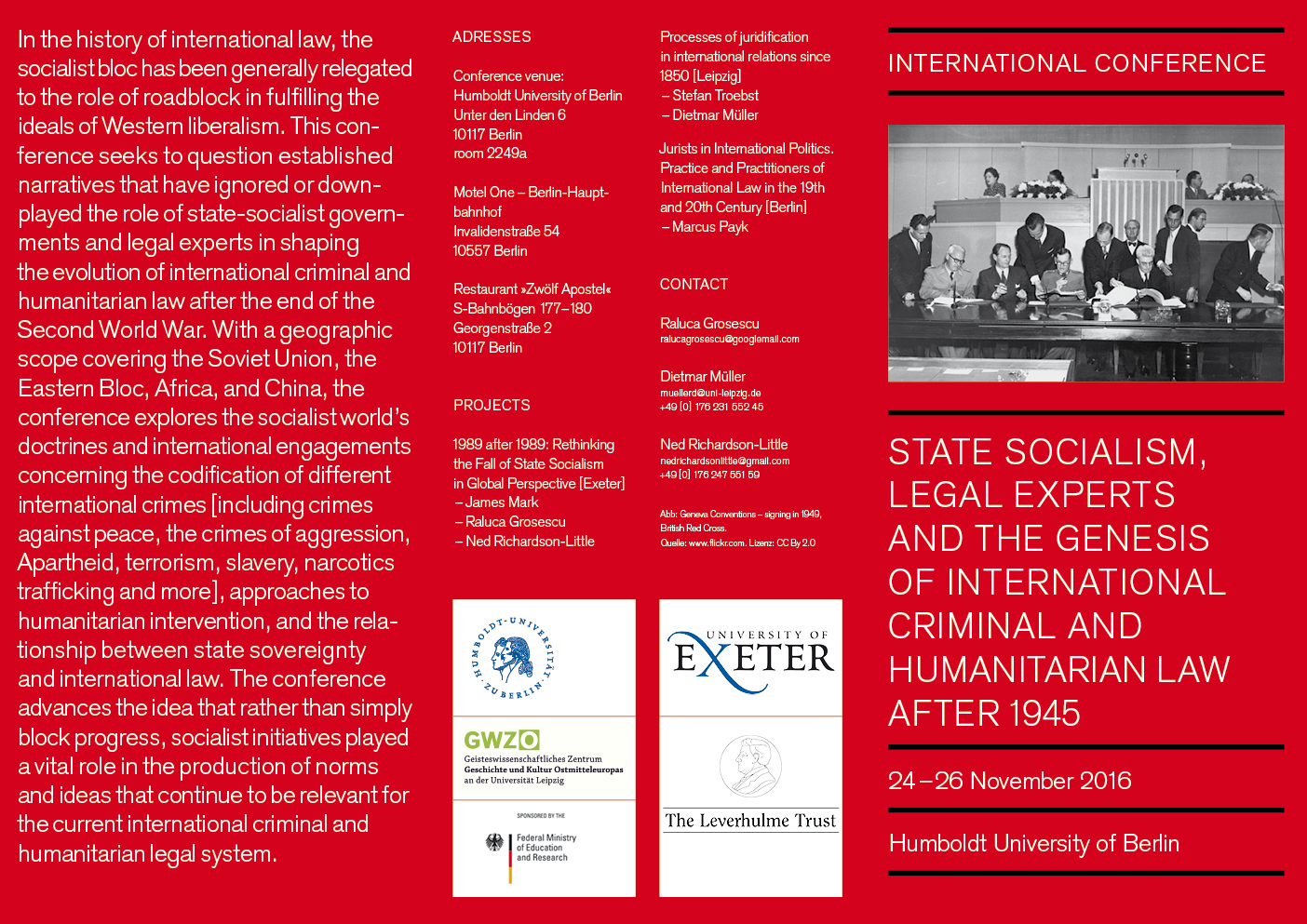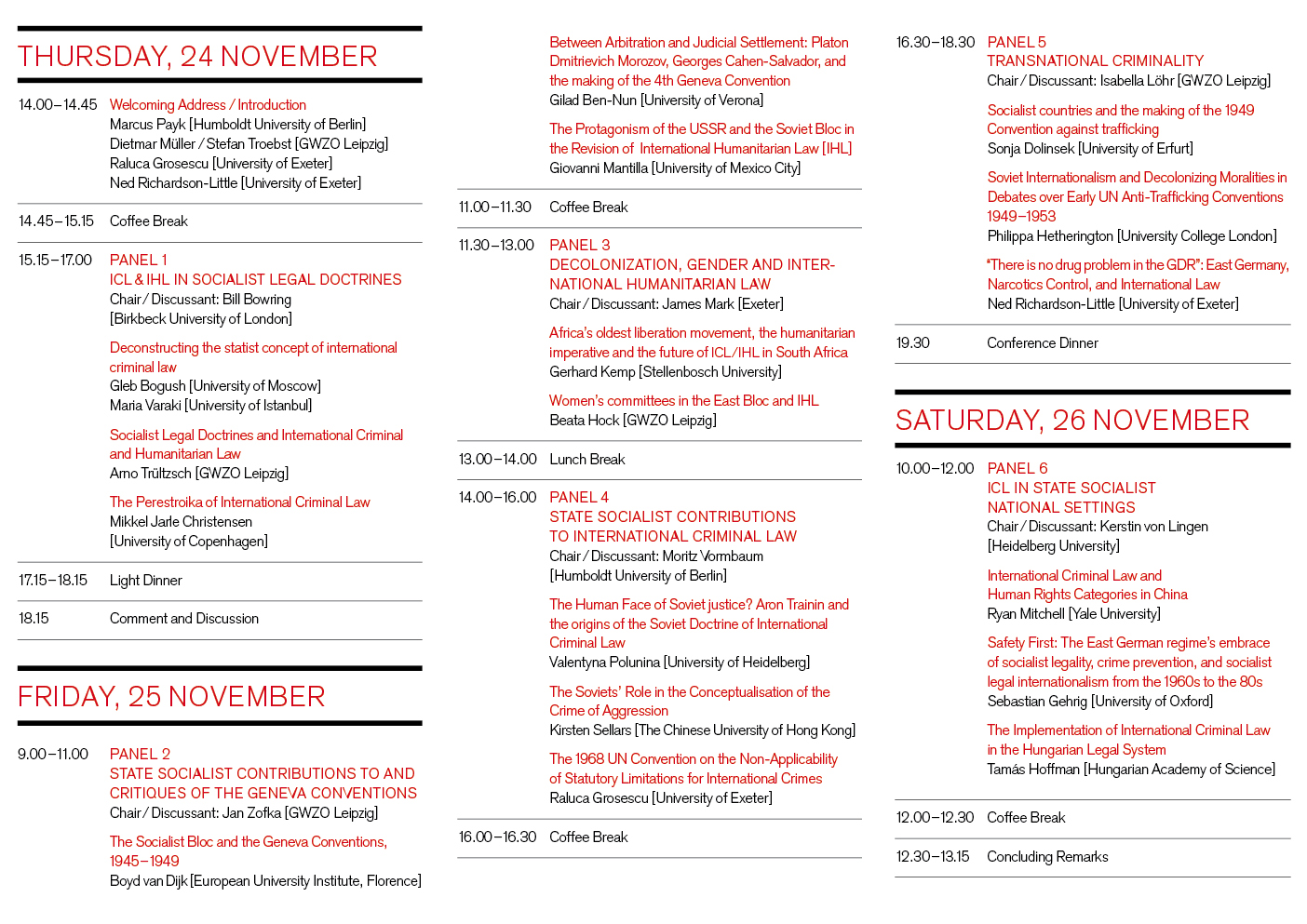Join us for our next conference on State Socialism, Heritage Experts and Internationalism in Heritage Protection after 1945
Posted on 26 April, 2017 in1989 after 1989 Area Studies Cold War Communism Heritage Heritage Experts Internationalism Post Socialism Post-Soviet Cities Post-Soviet Countries Socialism

Join us in Exeter for our conference exploring the rising contributions of socialist and non-aligned actors to the development of heritage at both domestic and international levels.
Conference dates: 21-22 November 2017
Conference location: The University of Exeter
Call for Papers deadline: 20 June 2017
CALL FOR PAPERS
Histories of heritage usually perceive their object of study as a product of western modernity, and exclude the socialist world. Yet, understood as a cultural practice and an instrument of cultural power, and as a “right and a resource”, heritage has played important roles in managing the past and present in many societies and systems. In the postwar period, preservation became a key element of culture in socialist and non-aligned states from China, the Soviet Union, and the Eastern Bloc to Asia, Latin America and Africa. Attention paid to the peoples’ traditions and heritage became a way to manifest the superiority and historical necessity of socialist development. However, the contribution of socialist states and experts to the development of the idea of heritage is still to be fully excavated.
The conference aims to understand the rising contributions of socialist and non-aligned actors to the development of heritage at both domestic and international levels. This phenomenon was in part the result of country-specific factors – such as a reaction to rapid industrial development; the destruction of both the Second World War or wars of national liberation; and the necessity to (re)-invent national traditions on socialist terms. But it was also due the growth of a broader international consensus on international heritage protection policies – in which socialist and non-aligned states and their experts played an important role. To this end, the conference will also address the relationship between socialist conceptions of heritage and those found in the capitalist world: to what extent can we discern the convergence of Eastern and Western dynamics of heritage discourses and practices over the second half of the twentieth century? To what degree did heritage professionals from socialist states play a role in the formation of the transnational and transcultural heritage expertise? To what extent did heritage still play a role in Cold War competition? Socialist states claimed that their respect for progressive traditions and material culture distinguished their superior methods of development from that of the capitalist world. Non-Aligned countries often attempted to blend aspects of socialist and capitalist logics of cultural heritage politics.
Conference themes to be addressed in papers include (but are not limited to):
- The rise of interest in, and conceptualisation of, heritage under socialist and non-aligned states;
- the transnational and transcultural circulation of ideas about heritage both within an expanding world of socialist states and across Cold War ideological divides;
- the role of socialist experts in international debates over heritage;
- the role of individual actors as cultural brokers within the cultural heritage field;
- the role of international organisations, such as UNESCO, ICOMOS, ICCROM, UIA and others in providing a platform for professional communication and knowledge exchange involving the socialist world;
- the role of the Cold War in the development of heritage;
- the role of national traditions, experience and transnational cooperation across the Cold War divide in the creation of concepts and practices of socialist heritage;
- the legacies of the work of socialist states and experts in contemporary heritage practices.
Abstracts of 300-500 words, together with an accompanying short CV should be submitted to Natalie Taylor (N.H.Taylor@exeter.ac.uk) by June 20, 2017.
The selected participants will be notified by July 20, 2017.
Funding opportunities for travel and accommodation are available, but we ask that potential contributors also explore funding opportunities at their home institutions.
To download a copy of the Call for Papers and for further information about the conference go to our State Socialism, Heritage Experts and Internationalism conference page
It is kindly supported by Exeter University’s Leverhulme Trust-funded project 1989 after 1989: Rethinking the Fall of State Socialism in Global Perspective.
Conference conveners:
Prof. James Mark and Dr. Nelly Bekus, University of Exeter, Leverhulme Trust-funded project 1989 after 1989: Rethinking the Fall of State Socialism in Global Perspective
Dr. Michael Falser, Cluster of Excellence Asia and Europe in a Global Context, Heidelberg University
Join us for our conference on the “Other Globalisers”, Exeter 6-7 July 2017
Posted on 23 February, 2017 in1989 after 1989 East Asia Eastern Europe Economy Globalisation Latin America Neoliberalism Post Socialism Rethinking 1989 Socialism South Africa Soviet Union

The Other Globalisers: How the Socialist and the Non-Aligned World Shaped the Rise of Post-War Economic Globalisation
Location: Exeter University, UK
Date: 6-7 July 2017
Abstract Deadline: 18 March 2017
Papers are now invited for our exciting conference addressing how the socialist and non-aligned world shaped the rise of post-war economic globalisation. This conference is the second in a series of events exploring how processes and practices that emerged from the socialist world shaped the re-globalised world of our times.
CONFERENCE SYNOPSIS
In the wake of the Second World War, the world economy began to ‘reglobalise’ – following the disintegrative processes of the interwar period. This story has most often been told as the final triumph of a neoliberal international order led by the West. Recent research, however, suggests that the creation of our modern interconnected world was not driven solely by the forces of Western capitalism, nor was it the only model of global economic interdependence that arose in the second half of the twentieth century. This conference aims to rethink the histories of postwar globalisation by focusing on the socialist and non-aligned world, whose roles in the rise of an economically interconnected world have received substantially less attention.
This conference aspires to address a wide variety of processes, practices and projects – such as efforts to create alternative systems of international trade, new business practices, through to theoretical conceptualisations of economic interconnectedness – and examine a broad range of actors, such as e.g. governments, experts, international institutions, and business ventures. It will also explore whether such initiatives were alternative at all: as recent research has suggested, actors from these worlds could be contributors to the emerging neoliberal consensus, as well as to other forms of regional economy and global trade that survive to this day. We also hope to encourage an interdisciplinary dialogue between scholars using different approaches to global interconnectedness, and/or working on a variety of regions (e.g. Latin America, Africa, Asia, Eastern Europe and the Soviet Union).
Abstracts of 300-500 words, together with an accompanying short CV should be submitted to Natalie Taylor (N.H.Taylor@exeter.ac.uk) by 18 March 2017.
The selected participants will be notified by the end of March 2017.
Funding opportunities for travel and accommodation are available, but we ask that potential contributors also explore funding opportunities at their home institutions.
This event is kindly supported by Exeter University’s Leverhulme Trust-funded project 1989 after 1989: Rethinking the Fall of State Socialism in Global Perspective.
The full call for papers is available on our conference page
→ Download the Call for Papers The Other Globalisers
[Top]
State Socialism & International Criminal & Humanitarian Law after 1945 Conference Programme
Posted on 15 November, 2016 in1989 after 1989 Eastern Europe International Criminal Law International Humanitarian Law Socialism South Africa Transitional justice

State Socialism, Legal Experts and the Genesis of International Criminal and Humanitarian Law after 1945
November 24-26, 2016
 Conference Venue:
Conference Venue:
Humboldt University of Berlin
Unter den Linden 6
10117 Berlin
Room 2249a
The programme for our international collaborative conference with the Leipzig Centre for the History and Culture of East-Central Europe (GWZO), and the Humboldt University of Berlin is now available. It will take place on the 24-26 November, 2016 at Unter den Linden 6, Room 2249a, Humboldt University of Berlin, Germany.
It brings together 3 research projects – 1989 after 1989, Processes of Juridification in International Relations since 1850 based at Leipzig and Jurists in International Politics Practice and Practitioners of International Law in the 19th and 20th Century based in Berlin.
Conference Synopsis
In the history of international law, the socialist bloc has been generally relegated to the role of roadblock in fulfilling the ideals of Western liberalism. This conference seeks to question established narratives that have ignored or downplayed the role of state-socialist governments and legal experts in shaping the evolution of international criminal and humanitarian law after the end of the Second World War. With a geographic scope covering the Soviet Union, the Eastern Bloc, Africa, and China, the conference explores the socialist world’s doctrines and international engagements concerning the codification of different international crimes (including crimes against peace, the crimes of aggression, Apartheid, terrorism, slavery, narcotics trafficking and more), approaches to humanitarian intervention, and the relationship between state sovereignty and international law. The conference advances the idea that rather than simply block progress, socialist initiatives played a vital role in the production of norms and ideas that continue to be relevant for the current international criminal and humanitarian legal system.
The conference commences at 14:00 on the 24 November with a welcome address and introduction from the conference organisers – Marcus Payk, Humboldt University of Berlin; Dietmar Mueller and Stefan Troebst, GWZO Leipzig; Raluca Grosescu, University of Exeter and Ned Richardson-Little, University of Exeter. Papers will then be presented that deal with International Criminal Law and International Humanitarian Law in socialist legal doctrines.
Panels on the following day will include papers on state socialist contributions to and critiques of the Geneva Conventions; decolonisation, gender, and International Humanitarian Law, state socialist contributions to International Criminal Law; and Transnational Criminality. The final day will debate International Criminal Law in state socialist national settings and will include case studies from China and Hungary.
To register your interest in attending this conference please contact Raluca Grosescu and Dietmar Mueller
More information on the conference can be found on our conference pages.
[Top]
(Re)Thinking Yugoslav Internationalism Conference Programme now available
Posted on 26 September, 2016 in1989 after 1989 Cold War Eastern Europe End of Yugoslavia Globalisation Post Socialism Socialism

(Re)Thinking Yugoslav Internationalism – Cold War Entanglements and their Legacies
29 September – 1 October 2016

VENUE:
University of Graz
Meerscheinschlössl / Festsaal
Mozartgasse 3
8010 Graz
** Please be aware that the conference venue has recently changed and will no longer be at Merangasse 70, Universitatszentrum. **
→ Google Map of Meerscheinschlössl
The conference programme is now available for our collaborative conference taking place this Thursday to Saturday in Graz, Austria.
It will open at 4pm on the 29th September with a welcome address from Professor Florian Bieber, University of Graz, followed by a Keynote speech from Kristen Ghodsee of Bowdoin, USA, entitled Women in Red: East European Mass Women’s Organizations and International Feminism during the Cold War.
Panels on Friday 30th will include papers on the theory and practice of Non-Alignment and Yugoslav foreign policy as well as elite socialisation and Global Actors. The day will conclude with a Keynote speech from 1989 after 1989’s Professor James Mark.
The final day of the conference will feature a witness panel discussion with Budimir Loncar – the last Yugoslav Minister of Foreign Affairs; as well as papers on race, anti-Colonialism and Yugoslavia in post-Colonial Africa; economics, self-management and visions of non-capitalist development; the United Nations, international law, gender and development; and tourism, architecture and cultural diplomacy.
More information on the conference can be found on our conference page and on Facebook https://www.facebook.com/events/1088023487942103/
[Top]Join us for our (Re)Thinking Yugoslav Internationalism Conference in Graz, 29 September – 1 October
Posted on 20 September, 2016 in1989 after 1989 End of Yugoslavia Globalisation Rethinking 1989 Socialism

Coinciding with the 55th anniversary of the Belgrade summit and the foundation of the Non-Aligned Movement, this conference will address a range of questions relating to the wealth of diplomatic, economic, intellectual and cultural encounters and exchange between 1945 – 1990, both within the Non-Aligned Movement, across the socialist world and with the developed countries. It will map the history of Yugoslavia’s global engagements not only as a subject associated with political and diplomatic
history, but also as a broader societal and cultural project.
This is a collaborative conference between ourselves and the Centre of Southeast European Studies at the University of Graz.
WHERE:
University of Graz
Meerscheinschlössl / Festsaal
Mozartgasse 3
8010 Graz
→University of Graz campus map
WHEN:
29 September 16:00 – 19:00 1 October
KEYNOTE SPEAKERS:
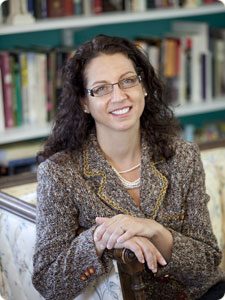 Professor Kristen Ghodsee
Professor Kristen Ghodsee
Bowdoin University, USA
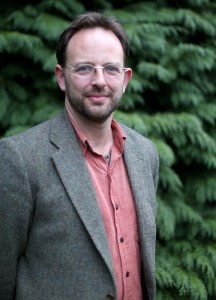 Professor James Mark
Professor James Mark
University of Exeter & 1989 after 1989, UK
[Top]
Human Rights after 1945 Conference Report Published
Posted on 29 June, 2016 in1989 after 1989 Eastern Europe Globalisation Human Rights Post Socialism Rethinking 1989 Socialism

The conference Human Rights after 1945 in the Socialist and Post-Socialist World took place on the 3 – 5 March 2016 at the German Historical Institute, Warsaw. It was a collaborative conference between 1989 after 1989; the German Historical Institute Warsaw; Georg-August University of Göttingen and the London School of Economics. The aim of the conference was to highlight the role and historical agency of the socialist world in the history of human rights.
The conference report is now available on our conference pages and on Geschichte Transnational. It summarises papers presented across 6 panels covering topics such as state socialism, human rights and globalisation; how human rights is defined internationally; state socialist conceptualisation of rights and human rights; socialist foreign policy; transnational movements and flows; and political dissent in relation to the global history of human rights.
The importance of analyzing vernacular human rights, i.e. analyzing when and how people used human rights languages [5], was one of the leitmotifs of the conference. The issue of teleology and normativity in historical human rights research was another major topic. Consequently, many papers presented stories of failures that contradict positivist narratives and challenge policy-orientated narratives of democratic transition. Parallel to transnational and international human rights history, the role of the state in human rights history was another key issue of the conference. Bringing the state back in, human rights can also be seen as an element of legal history – a promising approach embedding the highly normative notion of human rights in a wider legal history context. This conference brought together scholars working on various regions and actors in a truly fruitful manner. It linked different approaches and perspectives on the history of human rights in a way that contributed to an urgently needed, more complex understanding of the socialist world’s role in human rights history.
Read the full conference report.
[Top]CFP: State Socialism, Legal Experts & the Genesis of International Criminal & Humanitarian Law after 1945
Posted on 3 May, 2016 in1989 1989 after 1989 Cold War Communism East Asia Eastern Europe Human Rights International Criminal Law International Humanitarian Law Latin America Post Socialism Socialism Socialist Elites South Africa

Humboldt University of Berlin
The University of Exeter, the Leipzig Centre for the History and Culture of East-Central Europe (GWZO), and the Humboldt University of Berlin
24 – 26 November 2016
Call for Papers Deadline: 15 June 2016
State Socialism, Legal Experts and the Genesis of International Criminal and Humanitarian Law after 1945
In the history of international law, the socialist bloc has been generally relegated to the role of roadblock to the fulfillment of the ideals of Western liberalism. Scholars of international criminal law (ICL) and international humanitarian law (IHL) have often dismissed the contributions of socialist legal initiatives as little more than Cold War propaganda and thus irrelevant to understanding the historical evolution of judicial norms and the modern international system. The establishment of different international tribunals since the collapse of the Soviet Union has only reinforced the notion that the socialist world was little more than an impediment to progress. Nevertheless, the American-led global war on terror has done much to call into question Western commitment to the laws of war.
This conference seeks to explore the role of state-socialist intellectuals, experts and governments in shaping the evolution of ICL and IHL since the end of the Second World War. Actors from Eastern Europe, the USSR, and East Asian and African socialist states actively participated in international debates regarding international legal norms, the meaning of state sovereignty, and in the negotiation of all major ICL and IHL conventions after 1945. In various cases the socialist bloc was often more enthusiastic, and timely, in supporting and ratifying international legal agreements than Western governments, even if these initiatives were inseparable from political agendas. Although they systematically opposed the creation of international tribunals, experts from socialist countries led the way in many areas, such as the codification of crimes against peace and Apartheid or the elimination of statutory limitations for major ICL offences. The socialist world participated also in debates over the international legal status of drug conflicts and revolutionary groups funded by narcotics trafficking. Deliberations on the criminalization of terrorism and the regulation of armed conflicts were closely linked to the politics of “wars of liberation” by socialist forces in Africa, South-East Asia, and Latin America. Socialist legal experts were active participants in transnational epistemic communities and engaged in broader global projects, initiatives, and mobilizations across the Cold War divide.
We encourage proposals on the following topics, and from scholars working on socialist regimes, experts and movements across the world. You are welcome to submit proposals on other themes related to this topic.
- The contributions of the socialist countries and experts to debates on the general principles of ICL and IHL (the relationship between municipal and international law; the sources of ICL; the relationship between state sovereignty, ICL and IHL etc.).
- Socialist challenges to western liberal humanitarian doctrines and conventions (i.e. Peace proposals as alternative to new Geneva conventions, rejection of equality of nations before the law in cases of aggressive war, etc.)
- The role of socialist elites, legal experts, and courts in the development of specific fields of international crimes such as war crimes, genocide, crimes against humanity, and to acts of transnational criminality, such as terrorism, illicit drug trafficking, the arms trade, smuggling of nuclear materials, and trafficking in persons and slavery. The evolution of ICL and IHL discourse, ideas, and initiatives in state-socialist countries.
- The role of the Red Cross and other humanitarian NGOs in the socialist world (i.e. North Vietnamese rejection of ICRC protection for US POWs, the creation of local Red Cross organizations in the Eastern Bloc, etc.)
- Assessments of the continuing legacies and contributions of state socialist traditions of engagement with ICL and IHL on justice processes after 1989/91.
Abstracts of 300-500 words, together with an accompanying short CV should be submitted to Natalie Taylor (N.H.Taylor@exeter.ac.uk) by 15th June 2016.
The selected participants will be notified by 1st July 2016. They are then expected to submit their papers by 1st November 2016.
FUNDING OPPORTUNITIES
Funding opportunities for travel and accommodation are available, but we ask that potential contributors also explore funding opportunities at their home institutions.
The conference is organized by the University of Exeter, the Leipzig Centre for the History and Culture of East-Central Europe (GWZO), and the Humboldt University of Berlin.
This event is kindly supported by Exeter University’s Leverhulme Trust-funded project 1989 after 1989: Rethinking the Fall of State Socialism in Global Perspective, and the German Federal Ministry of Education and Research (BMBF).
Organizers: Raluca Grosescu (Exeter), Dietmar Müller (Leipzig), Marcus Payk (Berlin), Ned Richardson-Little (Exeter), Stefan Troebst (Leipzig), and Natalie Taylor (Exeter).
[Top]Human Rights after 1945 in the Socialist and Post-Socialist World Conference Programme
Posted on 29 February, 2016 in1989 1989 after 1989 Cold War Globalisation Human Rights Socialism

March 3-5, 2016
German Historical Institute Warsaw
Conference Room, 3rd Floor
Organizers:
German Historical Institute Warsaw
1989 after 1989: Rethinking the Fall of State Socialism in Global Perspective
Georg-August University of Göttingen
Synopsis
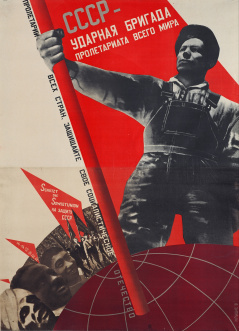 As both human rights and globalization have emerged as dynamic fields of historical and sociological research, the “socialist world” is relegated to a supporting role in the triumph of Western capitalism and liberal democracy. The aim of this conference is to question established narratives that have ignored or downplayed the role of socialist ideas, practice, and experts—be they state officials, loyal intellectuals or dissident activists — in the development of international human rights ideas, discourses, and systems in the post-war era. With a geographic scope that covers the Soviet Union, the Eastern Bloc, Yugoslavia and China, we hope to show that the socialist world did not just react passively to Western human rights politics, but was a vital participant in the production of global human rights with legacies that continued past the revolutions of 1989. By examining the socialist contribution to the evolution of human rights, we hope to contribute to revising standard narratives of globalization that focus exclusively on the perceived winners of these processes.
As both human rights and globalization have emerged as dynamic fields of historical and sociological research, the “socialist world” is relegated to a supporting role in the triumph of Western capitalism and liberal democracy. The aim of this conference is to question established narratives that have ignored or downplayed the role of socialist ideas, practice, and experts—be they state officials, loyal intellectuals or dissident activists — in the development of international human rights ideas, discourses, and systems in the post-war era. With a geographic scope that covers the Soviet Union, the Eastern Bloc, Yugoslavia and China, we hope to show that the socialist world did not just react passively to Western human rights politics, but was a vital participant in the production of global human rights with legacies that continued past the revolutions of 1989. By examining the socialist contribution to the evolution of human rights, we hope to contribute to revising standard narratives of globalization that focus exclusively on the perceived winners of these processes.
Conference Programme
Thursday, 3 March 2016
14:00-14:30
Welcoming Address
Ruth LEISEROWITZ (German Historical Institute Warsaw)
14:30-15:30
Introductory Panel: State Socialism, Human Rights and Globalization: In Search of a New Narrative
Hella DIETZ (Georg-August University of Göttingen)
Ned RICHARDSON-LITTLE (University of Exeter)
Robert BRIER (London School of Economics)
15:30-16:00 Coffee break
16:00-18:00
Panel 1: Defining Human Rights Internationally
Steven JENSEN (Danish Institute for Human Rights)
Defining the Social in the Global: Social Rights, UN Diplomacy and the Emergence of International Non-Discrimination Norms and Politics, 1950-1960
Alexander OSIPOV (European Centre for Minority Issues)
The Soviet Union’s Involvement in the Establishment of the European Minority Rights Regime
Discussant: Arnd BAUERKÄMPER (Free University Berlin)
19:00 Conference Dinner
Friday, 4 March 2016
09:00-11:00
Panel 2: State-Socialist Conceptions of Rights and Human Rights
Jennifer ALTEHENGER (King’s College London)
Rights, Not Human Rights: Communist China’s National Constitution Discussion, 1954
Michal KOPEČEK (Institute for Contemporary History, Prague and Charles University, Prague)
Socialist Conceptions of Human Rights and its Dissident Critique
Todor HRISTOV (University of Sofia)
Rights to Weapons: Human Rights as a Resource in Workplace Conflicts in Late Socialist Bulgaria
Discussant: Paul BETTS (Oxford University)
11:00-11:30 Coffee Break
11:30-13:00
Panel 3: Tolerance, Difference, and Rights under Socialism
Ivan SABLIN (University of Heidelberg)
Illusive Tolerance: Buddhism in the Late Soviet State
Zhuoyi WEN (Hong Kong Institute of Education)
Contesting Cultural Rights in Post-socialist China
Discussant: tba
13:00-14:30 Lunch break
14:30-16:00
Panel 4: Human Rights as Socialist Foreign Policy
Sebastian GEHRIG (Oxford University)
The Fifth Column of the Third World? The East German Quest for International Recognition through UN Rights Discourses
Jens BOYSEN (German Historical Institute Warsaw)
Polish Engagement in the United Nations as a Tool for Justifying Communist Rule in Poland and Gaining Leeway in the Warsaw Pact
Discussant: Robert BRIER
(London School of Economics)
16:00-16:30 Coffee Break
16:30-18:00
Panel 5: Transnational Movements and Flows
Christie MIEDEMA (University of Amsterdam)
Negotiating Space for International Human Rights Activism: Amnesty International in Eastern Europe before 1989
Rósa MAGNÚSDÓTTIR (University of Aarhus)
Soviet-American Intermarriage: Transnational Love and the Cold War
Discussant: James MARK (University of Exeter)
19:00 Dinner for the conference participants
Saturday, 5 March 2016
9:00-11:00
Panel 6: Dissent and Human Rights
Simone BELLEZZA (University of Eastern Piedmont)
The Right to Be Different: Ukrainian Dissent and the Struggle Against a Global Consumerist Cultural Standardization
Hermann AUBIÉ (University of Turku)
Between Loyalty and Dissent: Revisiting the History of Human Rights in China Through the Discourse of Chinese Intellectuals and Dissidents
Zsófi a LÓRÁND (European University Institute, Florence)
Feminist Dissent, Activism for the Elimination of Violence against Women, and the Human Rights Discourse in Yugoslavia in the 1970s-1980s
Discussant: Celia DONERT (University of Liverpool)
11:00-11:30 Coffee Break
11:30-13:00
Concluding Panel: The Place of State Socialist Societies in the Global History of Human Rights
Paul BETTS (Oxford University)
James MARK (University of Exeter)
Celia DONERT (University of Liverpool)
Call for Papers: (Re)Thinking Yugoslav Internationalism – Cold War Global Entanglements and their Legacies
Posted on 14 December, 2015 in1989 after 1989 Cold War End of Yugoslavia Globalisation Rethinking 1989 Socialism

Graz, Austria
Centre for Southeast European Studies, University of Graz and the University of Exeter
30 September – 1 October 2016
Call for Papers Deadline: 28 February 2016
(Re)Thinking Yugoslav Internationalism – Cold War Global Entanglements and their Legacies
For more than forty years, Yugoslavia was one of the most internationalist and outward looking of all socialist countries in Europe, playing leading roles in various trans-national initiatives – principally as central participant within the Non-Aligned Movement – that sought to remake existing geopolitical hierarchies and rethink international relations. Both moral and pragmatic motives often overlapped in its efforts to enhance cooperation between developing nations, propagate peaceful coexistence in a divided world and pioneer a specific non-orthodox form of socialism.
Although the disintegration of socialist Yugoslavia has received extensive treatment across a range of disciplines, the end of Yugoslavia’s global role and the impacts this had both at home and abroad, have received little attention. Coinciding with the 55th anniversary of the Belgrade summit and the foundation of the Non-Aligned Movement, this conference seeks to open up a range of questions relating to the wealth of diplomatic, economic, intellectual and cultural encounters and exchange between 1945 – 1990, both within the Non-Aligned Movement, across the socialist world and with the developed countries. It would map the history of Yugoslavia’s global engagements not only as a subject associated with political/diplomatic history, but also as a broader societal and cultural project. Important witnesses involved in those exchanges and alliances will also be invited to share their experiences.
We welcome papers from different disciplines and from diverse perspectives, whether dealing with aspects of Cold War international cooperation, development, Yugoslavia’s global role, or the ‘global’ Cold War from the perspective of the developing world and the ‘global South’. We particularly encourage proposals which would reflect on:
- the roots of Yugoslav internationalism and how it was understood in cultural/economic/social as well as political/diplomatic terms;
- the contours of Yugoslav diplomacy and the ways Yugoslav elites conceptualised their global role;
- the role of Yugoslavia in the United Nations, its agencies and other international organisations as the fora for global encounters and in particular the attempts at tackling global inequality and alternative development;
- the relationship between Yugoslavia, the different liberation movements and the newly emerging independent nations in the ‘global South’ (including cultural diplomacy, labour migration, individual travel);
- the realities and challenges of foreign trade, investment construction and economic cooperation;
- the ways international engagements reshaped aspects of political, economic or cultural life back in Yugoslavia;
- the role and significance of the Non-Aligned Movement during the Cold War and today;
- the international impact of the end of Yugoslavia and the collapse of her global role;
- the legacies and new understandings of Yugoslavia’s global role.
Abstracts of 300-500 words, together with an accompanying short biographical note should be submitted to Natalie Taylor (N.H.Taylor@exeter.ac.uk) by 28 February 2016.
Funding opportunities for travel and accommodation are available, but we ask that potential contributors also explore funding opportunities at their home institutions.
This event is kindly supported by the Centre for Southeast European Studies and the Leverhulme Trust-funded project 1989 after 1989: Rethinking the Fall of State Socialism in Global Perspective at the University of Exeter.
[Top]Call for Papers: Human Rights after 1945 in the Socialist and Post-Socialist World
Posted on 12 October, 2015 in1989 after 1989 Communism Globalisation Human Rights Post Socialism Socialism

German Historical Institute, Warsaw
March 3 – 5, 2016
Call for Papers Deadline: 27 November 2015
Human Rights after 1945 in the Socialist and Post-Socialist World
Histories of late twentieth century global change have focused on its perceived winners on a macro-scale: democratic capitalism, global markets and individual rights. In such formulations, the “socialist world” and its history appear irrelevant to understanding global processes and unable to inform liberal Western democratic societies.
The global rise of human rights might look like a particularly striking case in point. The formal guarantees of rights in socialist societies, after all, seemed to have no substantial effect on these societies’ political and legal practices, and the debate on civil society in “the West” which east European human rights activists had inspired during the 1980s, did not survive socialism’s fall in that region.
In this conference, we want to question those narratives. Actors from the socialist world – be they state officials, loyal intellectuals or dissident activists – actively participated in international conflicts over the meaning of democracy, economic freedom, religious liberty and national self-determination in the post-war period. Socialist officials took part in drafting the U.N. covenants of 1966, in turning South African apartheid or repression in Chile into global causes célèbres or in promoting women’s rights. African socialists shaped human rights discourses by blending them with the struggle for self-determination, while Latin American activists grafted human rights to their Marxist ideas. Chinese Communists joined traditional ideas of cultural difference with Leninist ideology to create a distinct human rights discourse. Dissident intellectuals, on the other hand, did not necessarily take the West’s side in the Cold War when they criticized socialist realities, but developed innovative human rights vernaculars deeply shaped by their unique contexts. In sum, the “socialist world” did not just react passively to Western human rights politics, but was a vital participant in the story of the production of global human rights.
This conference seeks to explore how the socialist world can be written into the broader global narratives of the rise of human rights in the 20th century, and even revise these narratives. Our understanding of the “socialist world” is deliberately inclusive. It entails the socialist systems of eastern Europe, Eurasia, Africa, Southern and East Asia as well as socialist and Communist parties and movements more broadly, and anti-colonial or anti-dictatorial movements in the Global South.
We welcome papers from different disciplines and from diverse perspectives, whether dealing with official discourses, state policies, right experts, or national or transnational political movements.
We particularly encourage proposals on the following topics:
- rights cultures within socialist societies, including reflections on the global context of their construction;
- the contribution of socialist elites, experts and social groups to the global rise of human rights;
- connections across the socialist world in the production of conceptions of rights, including reflections on the role of international organizations or transnational movements;
- the importance of rights discourses for socialist regimes and movements in establishing legitimacy at home and abroad;
- the use of rights discourses by opposition movements, and the relationship between official/ alternative rights movements within socialist societies;
- the legacy of rights discourses within socialist and post-socialist societies today;
- comparisons, and connections between, the production of rights ideas in the socialist and non-socialist worlds;
- rethinking the role of rights and the collapse of socialist states;
- broader reflections on writing the socialist world into the history of rights;
- broader reflections on how these stories contribute to the rethinking of the story of cultural and political globalization.
This conference is the first in a series of meetings exploring how processes and practices that emerged from the socialist world shaped the re-globalized world of our times. Throughout, the legacies of this socialist engagement with globalising processes in the socialist and post-socialist world will also be an important point of interest.
Please send a brief abstract of 300-500 words, as well as a brief CV, by November 27, 2015, to Natalie Taylor at the University of Exeter (N.H.Taylor@exeter.ac.uk ). All organizational questions can be sent to Natalie Taylor. Academic queries should be sent to Hella Dietz (Hella.Dietz@sowi.uni-goettingen.de ).
Download the Call for Papers: Call for Papers Human Rights after 1945
Substantial funding opportunities for travel and accommodation are available, but we ask that potential contributors also explore funding opportunities at their home institutions.
This event is kindly supported by the German Historical Institute in Warsaw and the Leverhulme Trust-funded project 1989 after 1989: Rethinking the Fall of State Socialism in Global Perspective at the University of Exeter.
[Top]





